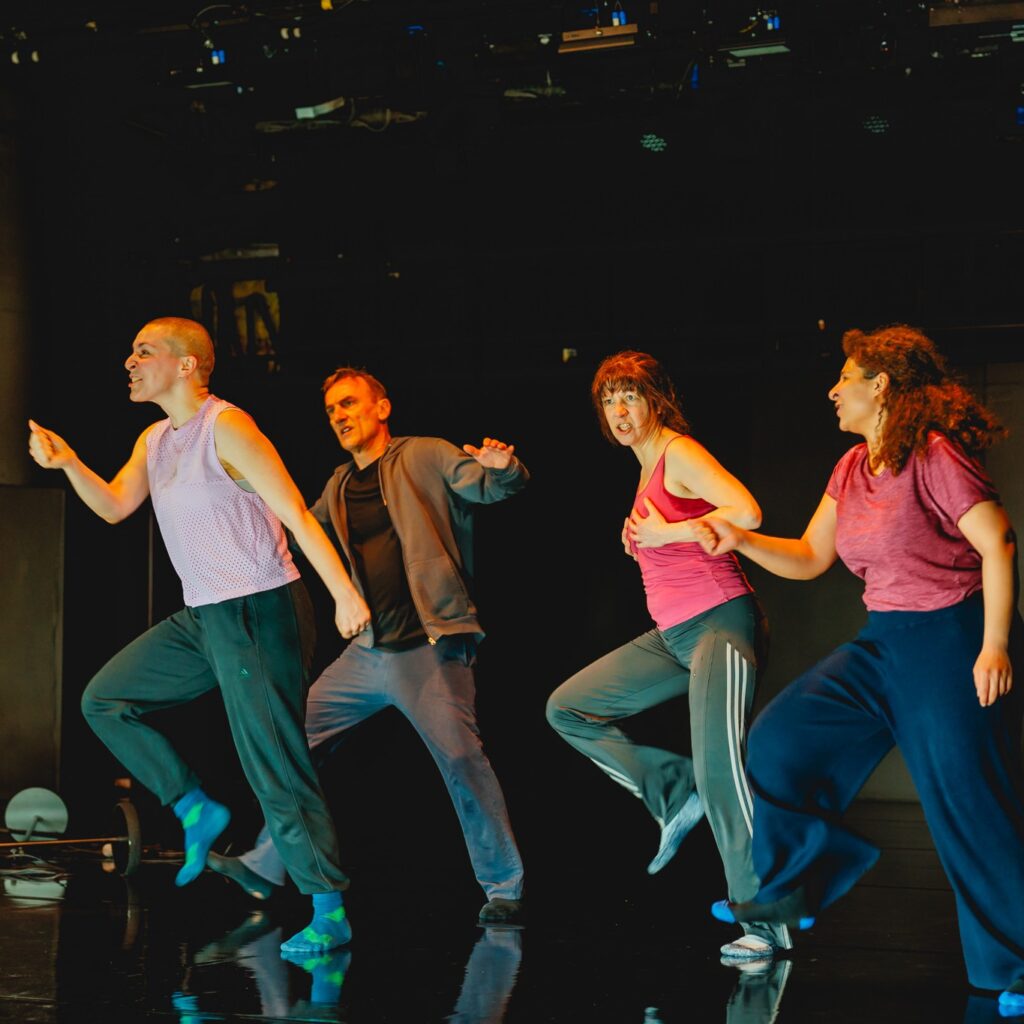Mladinsko Theatre, Ljubljana, premiere 6th April 2024
In 1991, Slovenia declared its independence, separating from Yugoslavia. Over the next few years, it joined the UN, NATO, and the European Union, becoming part of Western Europe. The country can be proud of its free media, acceptance of immigrants, and legalization of same-sex marriage rights, placing it on par with Germany or Austria. Since the beginning, Slovenians have had a dream to be “little Switzerland”, and to this day, some refer to their country as such. The main slogan of the tourist advertising campaign is I feel Slovenia. The creators of the performance Slovenia Counts, German director Sebastian Nübling and musician Jackie Poloni, explore how the citizens of Slovenia truly feel about their country.
Seven actors dressed in colourful, ordinary hoodies, resembling the average person, individually or in pairs, move in a rhythmic manner that matches the electronic music at the beginning of the scene. The postures of some, mechanical gait, or gaze, evoke associations with nationalist groups. Sometimes they stop at the edge of the stage and, like a glitched sim from a computer game, cannot move forward, instead marching in place while staring ahead. They retreat backstage, as if unable to proceed, then reappear, repeating the movement sequence multiple times until sweat begins to appear on their clothes and fatigue becomes visible on their faces.
These are the movements and gestures on which the entire production is based. Throughout the performance, the actors continuously exploit their bodies in repetitive sequences, occasionally breaking away to create a group scene in a different choreography, most of which represents an obsessive love for their country or weariness with it. Through movement, the performers explore Slovenia’s national myths, sometimes glorifying them by raising their hands in the air, and other times feeling ashamed. Their gestures reflect different attitudes toward the country. The first half is mostly based on the movements and motifs of hooligans, nationalists, and fanatics. The choreography takes place on a stage devoid of scenery. The only scenic element is several microphones arranged tightly, forming a circle on the left side of the stage. They serve various purposes depending on the scenes: as a telephone, interview microphone, or cage.
Nübling’s and Poloni’s performance is primarily intense physical theatre, where body and voice serve as the main means of expression, while text takes a secondary role. It’s an energetic journey, a trance-like trip built from bodies, movement, sound, and music which creates an auditory mosaic reflecting Slovenian society. Text appears in later stages of the performance, but its full understanding is not necessary for comprehension. The choreography itself and its meaning can suffice to convey a deeper sense. Conceptually and ambiguously, Slovenia Counts presents the face of contemporary Slovenia. Music by Jackie Poloni, a key element of the performance, sets the rhythm for the actors’ movements and the tempo of the entire production, also building tension and atmosphere, which, along with the creators, immerses us, the audience, in a Slovenian trip full of diverse cultural codes.

Slovenia Counts,, Mladinsko Theatre
The choreography from the first scene gradually unfolds, gaining an additional textual layer. Although the actors whisper something, it’s difficult to hear from the audience. Over time, the words become clearer and resonate on stage – “Slovenia.” Repeated rhythmically by the actors, they create a harmonious melody with electronic music, at times evoking a sense of participation in an alternative DJ set. The word is uttered with aggression and anger, repeated so often that it becomes like an incantation from a dark magic book, until eventually, repeated enough times, it loses its original meaning. A more detailed script emerged during rehearsals as a collaborative effort between the actors and the director appears later.
One actress – Janja Majzelj – recounts unpleasant situations she has encountered from neighbours regarding her romantic and sexual life, while simultaneously stating that she’s doing great and that these comments don’t affect her at all. Lea Aymard repeats several times that she’s not from here (literally, as she’s not an actress employed at Mladinsko), illustrating the situation of migrants in Slovenia. Vito Weis recounts what he encountered in the stairwell – dog faeces. Not only he, but others as well, speak about excretions. The textual layer is filled with human or animal secretions, or descriptions of foul odours. The simple and obscene text, along with repetitive movements, creates a dense atmosphere of confinement and being in an unpleasant place, sometimes even a sense of imprisonment.
This is clearly depicted in a scene where the actors begin to mimic various dogs, some playfully, others more seriously, barking at each other. This scene ends with one of the actors trapped in a tight cage made of microphones, barking without reason, as the other actors disappear from the stage. This may be a metaphor for the smallness of nationality and the political situation in Slovenia; its inability to speak for itself and being overwhelmed by larger states. However, as the creators emphasized, the performance also relates to Europe as a whole – in the face of the power of the American and Chinese empires, Europe can be perceived as a small, barking dog.
The acting team for this performance excels not only in acting challenges but also in performance, and they adapt well to this type of theatre. They can work excellently both individually and as a collective theatrical body that moves and reacts together. However, individual personalities emerge from this collective body, where each one presents a different personality. Some are more aggressive and prouder, shouting “Slovenia” and pounding their chests, while others seem bored, while others might appear to be atoning for being Slovenian by performing this movement. Each actor also demonstrates significant physical endurance required by the performance. Particularly striking is the scene where Lina Akif repeats the name of the country as fast as she can for a long time, to the point where she can barely catch her breath. The scene seems to be almost violent. It makes one want to interrupt to allow her to literally catch her breath from “Slovenia”.
In the second part of the performance, there’s a change in rhythm and choreography, transitioning into an ecstatic, stimulating scene of dance, narcissistic admiration, self-love. Actors shed some of their clothing and continue energetic routines on stage, mimicking sexual positions. During the wild dances, some begin to sing a song well-known to all Slovenians, used in tourism advertising for Slovenia – Slovenija, od kod lepote tvoje. This scene ironically and mockingly portrays the commercial facade of the country, which promotes itself as a utopian place for everyone. There’s plenty more humour in the performance. For instance, in a scene where Robert Prebil mimics a dictator’s political speech by shouting “We’re small because we’re small!” causing laughter from the audience, or when Lina Akif unsuccessfully tries to make a doctor’s appointment.
The performance ends with a repeated movement sequence from the first scene, which after an hour may begin to tire the audience. In my opinion, the repetition was unnecessary and took away the energy created before. However, at the end, the actors walk off the stage and stand among the audience, becoming one with us and collectively gazing at the stage, which remains empty. Slovenia Counts provides us with a conceptual image of contemporary Slovenian society after gaining independence – a country that is insecure, small, cramped, and surrounded by nosy neighbours.
The performance primarily operates on an emotional level, evoking intense feelings through both its choreography and the energetic delivery of the artists. Despite the ambiguous nature of text, the lack of specific facts about current events, and the absence of a traditional plot and characters, the creators have managed to capture the essence of this nation.
Credits:
Directors: Sebastian Nübling and Jackie Poloni//Dramaturgy: Goran Injac//Assistant dramaturg: Deja Crnović//Music: Jackie Poloni//Set design: Urša Vidic//Set designer assistant: Maruša Mali//Costume design: Slavica Janošević//Lighting design: Matjaž Brišar//Sound design: Sven Horvat
For tickets and further information, visit: Mladinsko.com
Further reading: Interview with Sebastian Nübling and Jackie Poloni
Karolina Bugajak is a theater critic from Poland, currently living in Ljubljana. She studied culture and contemporary art at the University of Lodz. The title of her master's thesis was "Theatricality and Exaggeration. Camp aesthetics as a strategy for creating new identities in the plays of Grzegorz Jaremko". Her main theatrical interests include topics such as institutional criticism, the representation of marginalized groups in plays, and most recently the theater of the former Yugoslav states.








